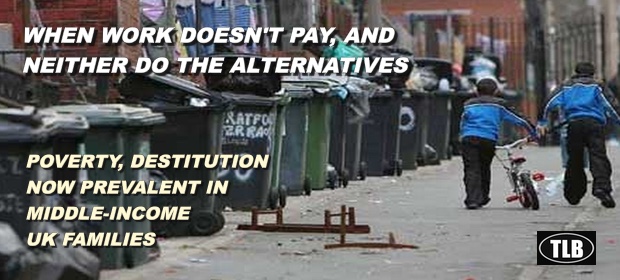
By RT
The middle classes are the “new poor” with half of families renting rather than owning their own home and many relying on benefits and tax credits to survive, a report from the Institute of Fiscal Studies (IFS) reveals.
According to research by the IFS and the Joseph Rowntree Foundation (JRF), middle income families with children now “more closely resemble poor families than in the past,” collecting 30 percent of their income from state support.
Extreme destitution is mostly seen in working families, as two thirds of children in absolute poverty have at least one employed parent. The share of women’s earnings taken up by the household rose from less than a fifth in 1994-95 to over a quarter 10 years later.
Middle income families are currently identified as one-child parents earning £25,700 (US$36,000) per household, parents of two children earning £30,000 or more, and £34,300 for couples with three children.
“This report paints a stark picture of the new face of poverty in the UK,” said JRF chief executive Julia Unwin.
“Falling unemployment has helped many families to keep their heads above the water, but slow wage growth, benefit squeezes and rises in the cost of essentials means there are still a shamefully high number living in poverty in the UK today.
“The fact that an increasing number of people in work are living in poverty shows that we need urgent, wide-ranging action to make a real difference in the living standards of low income households. Better pay and job security, improving skills and lowering costs such as childcare and housing would go a long way towards raising the living standards of those currently struggling to get by.”
The study found that since 2011-12, growth in employment was paralleled by a growth in weak earnings. While poorer households benefited from a fall in unemployment and the rise of two-income families, higher income homes have been held back by slow salary increases.
The associate director at the IFS and author of the Living Standards report said: “Tackling low income is increasingly about tackling the problems faced by low-earning working households. In the short term this would be aided by a continued recovery in the number of hours worked by those on low wages or by more second earners entering work. Ultimately substantial progress will depend crucially on economic policies that push up productivity.”
************
ER recommends other articles by RT




